Russian spy poisoning: What we know so far
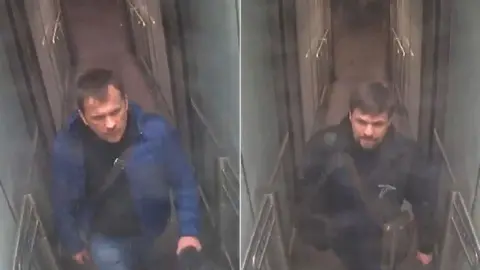 Metropolitan Police
Metropolitan PoliceOn 4 March, a former Russian spy and his daughter were found seriously ill on a bench in Salisbury. They had been poisoned by a nerve agent, in an attack "almost certainly" approved by the Russian state.
An extraordinary series of accusations and denials from the highest levels of governments came in the months that followed, culminating in diplomatic expulsions and international sanctions.
The attack on Sergei Skripal, 66, and his 33-year-old daughter, Yulia, in Salisbury, left them hospitalised for weeks.
Police linked the attack to another poisoning in June in which Dawn Sturgess and her partner Charlie Rowley were exposed to Novichok in nearby Amesbury, after handling a contaminated perfume dispenser. Ms Sturgess died in hospital in July.
What happened?
- Yulia Skripal flew into London's Heathrow Airport from Russia at about 14:40 GMT on Saturday, 3 March
- On Sunday, 4 March, at about 09:15 GMT, Mr Skripal's car was seen in Salisbury around London Road, Churchill Way North and Wilton Road
- At 13:30 GMT his car was seen driving down Devizes Road, towards the town centre
- Mr Skripal and his daughter arrived at the Sainsbury's upper level car park at the Maltings shopping precinct at 13:40 GMT
- Police said the pair went to The Mill pub before going to Zizzi restaurant at 14:20 GMT, where they stayed until 15:35 GMT
- At 16:15 GMT, emergency services received the first report of an incident
- Police found the pair on a bench outside Zizzi in an "extremely serious condition"
- Det Sgt Nick Bailey, who fell ill after attending the incident, was treated in hospital but discharged on 22 March
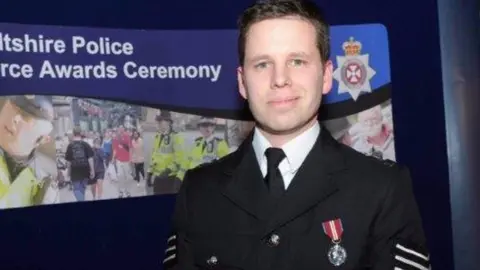
- 48 people were assessed in hospital in relation to the incident
- Ms Skripal was released from hospital on 9 April and her father was discharged on 18 May. Both were taken to a secure location
What has the investigation revealed?
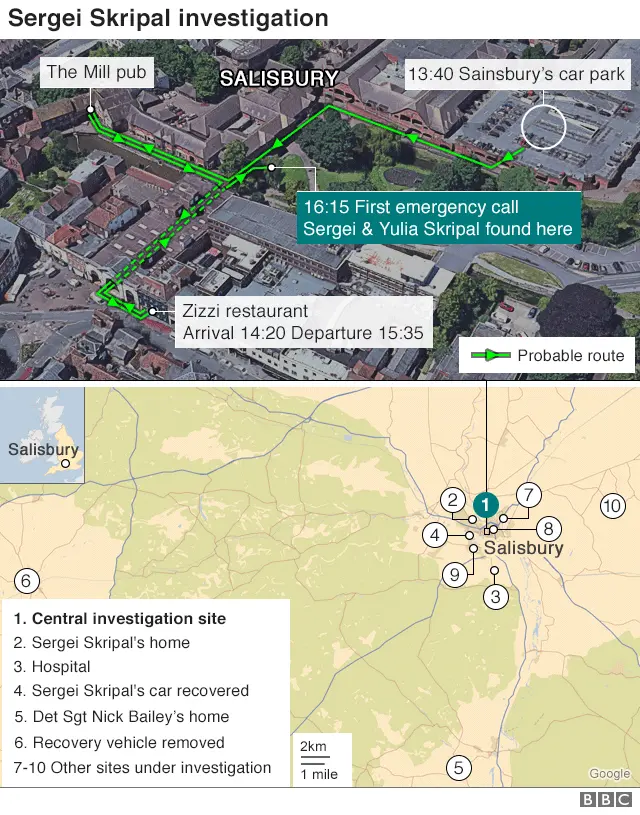

Police believe the Skripals were "targeted specifically" and are treating the case as attempted murder.
Detectives believe the pair first came into contact with the nerve agent Novichok at the front door of their home.
Traces of Novichok were also found at the Mill and Zizzi, where the Skripals spent the afternoon. Up to 500 people who visited the pub or the restaurant at the same time were told to wash their clothes and possessions.
Officers later focused searches in and around Mr Skripal's home and a nearby children's play area at Montgomery Gardens was cordoned off by police.
Police appealed for anyone who saw the pair in Mr Skripal's red BMW - licence plate number HD09 WAO - on the morning of the attack.
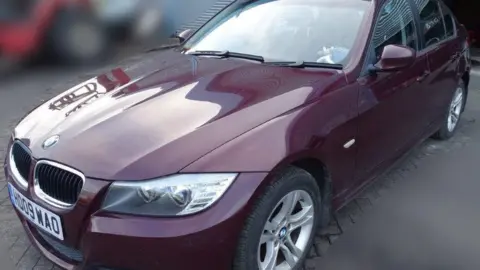 Metropolitan Police
Metropolitan PoliceA vehicle that is believed to have been used by Mr Skripal's friend to pick up Yulia from the airport on 3 March was removed from Durrington, Wiltshire, by the Army on 19 March.
Witness Jamie Paine said he saw a woman on a bench frothing at the mouth and her eyes "were wide open but completely white".
A doctor, who was shopping with her husband in the city centre on Sunday, said Ms Skripal was "slumped in her seat, completely unconscious" and had lost control of her bodily functions.
The investigation has so far involved 250 specialist counter-terrorism officers and about 180 military personnel, who were deployed to Salisbury to help remove vehicles and objects that may have been contaminated.
Prof Dame Sally Davies, the chief medical officer for England, stressed the risk of harm to the public was "low" but there was some concern that prolonged exposure could cause health problems.
Personnel from the Defence Chemical Biological Radiological and Nuclear Centre at Porton Down in Wiltshire identified the nerve agent.
Its head said the precise source of the nerve agent had not been verified, but it was likely to have been deployed by a "state actor".
Experts from the Organisation for the Prohibition of Chemical Weapons (OPCW) tested samples of the chemical.
Russia accused Britain of blocking access to the OPCW inquiry, but its proposal for a new, joint investigation was voted down at the international chemical weapons watchdog at The Hague on 4 April.
Russia lost the vote by 15 votes to six, while 17 member states abstained.
Who are the suspects?
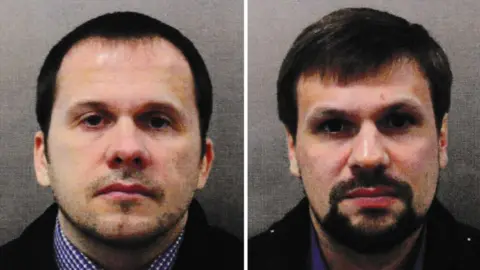 Met Police
Met PoliceTwo Russian nationals, who go by the names Alexander Petrov and Ruslan Boshirov, are suspects in the attempted murder.
They are understood to have arrived at Gatwick Airport on Russian passports from Moscow on 2 March, and stayed at the City Stay Hotel in Bow Road, east London.
The following day they visited Salisbury for reconnaissance before contaminating Mr Skripal's front door with Novichok on 4 March, police say.

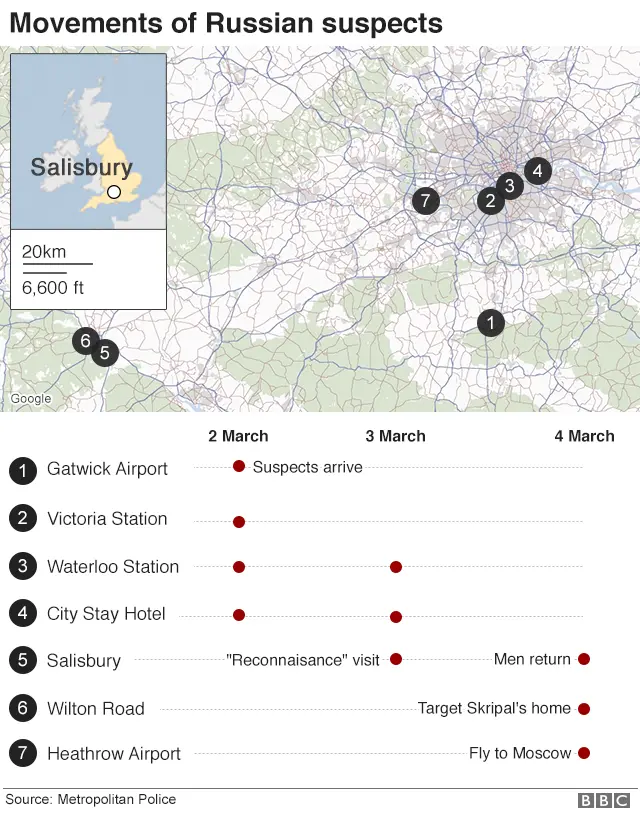

Officers believe a modified perfume bottle was used to spray the door.
The pair flew from Heathrow to Moscow later that same night.
The men, whose movements were captured on various CCTV cameras, are thought to be aged about 40 and operating under aliases.
The officers are thought to be from Russia's military intelligence service, the GRU, and the attack was "almost certainly" approved at a senior level of the Russian state, Theresa May has said.
In an interview with Russia's state-run international broadcaster, RT, the men said they were tourists, in the UK to visit the "wonderful town" of Salisbury and see its famous cathedral.
Details have since emerged showing the man calling himself Alexander Petrov has made around 10 trips to Europe in the last two years.
Documents first obtained by the investigative group Bellingcat, shared with the BBC, show that as well as visiting Paris, Geneva and Amsterdam, he appears to have visited the UK three times.
He seems to have visited once in September 2016, again between 28 February and 5 March 2017 and finally in March this year- during the period Sergei Skripal was poisoned.
On the final visit, the pair both travelled on genuine Russian passports. Recently published pages from Mr Petrov's passport dossiers contain unusual stamps and a blank page where there is normally biographical data - all evidence which may point to the men being undercover intelligence officers, BBC security correspondent Gordon Corera said.
An investigation by Bellingcat has claimed the real identity of the man calling himself Ruslan Boshirov is actually Colonel Anatoliy Chepiga - a highly decorated military officer.
Bellingcat later said the suspect calling himself Alexander Petrov is Alexander Mishkin, a doctor who has worked for Russian intelligence since 2010.
What does Russia say?
Since the attack, the Kremlin's media machine has responded with a combination of denials and sarcasm.
Russian President Vladimir Putin said the two suspects are civilians, not criminals and he hoped the men would tell their story soon. A day later an interview with the men was broadcast by Russia's state-run international broadcaster.
The Russian foreign ministry had previously called Mrs May's allegations "insane", and said the names and photographs of the two suspects "do not mean anything to Moscow".
At a UN Security Council meeting in September to discuss the attack, Russia dismissed evidence presented by the UK as "lies".
In a lengthy rebuttal of the allegations, Russia accused the UK of "disgusting anti-Russian hysteria".
Russian ambassador to the UN, Vasily Nebenzya, accused the British authorities of "Russiaphobia" and misleading the international community and its own citizens.
Previously, a Russian foreign ministry spokeswoman said the UK was one of the most likely sources of the nerve agent, along with the Czech Republic, Slovakia, Sweden or possibly the United States.
Another theory - offered by Russia's EU ambassador, Vladimir Chizhov - suggested a UK research laboratory in Wiltshire could be the source.
Have the suspects been arrested?
No. Prosecutors will not apply to Russia for the men to be extradited because Russia does not have extradition agreements with the UK.
However, a European Arrest Warrant has been obtained, should they travel to the EU.
Sue Hemming, of the UK Crown Prosecution Service (CPS), said there was enough evidence to provide a "realistic prospect of conviction" and it was "clearly in the public interest" to charge them with the Salisbury attack.
Police say officers continue to work with the CPS on the Amesbury incident.
Who are the victims?
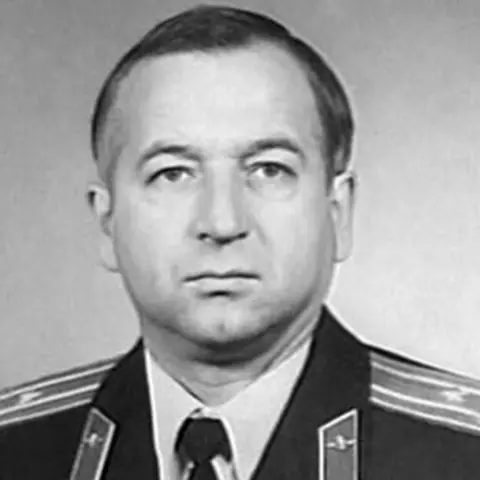
Colonel Skripal is a retired Russian military intelligence officer who was convicted of passing the identities of Russian intelligence agents working undercover in Europe to the UK's Secret Intelligence Service, MI6.
He was jailed for 13 years by Russia in 2006.
In July 2010, he was one of four prisoners released by Moscow in exchange for 10 Russian spies arrested by the FBI. He was later flown to the UK.
In recent years Mr Skripal is thought to have given lectures at military academies offering insights into Russia's foreign military intelligence agency, the GRU.
A friend from college, Vladimir Svyatski, described Mr Skripal as "very active, with a positive attitude and creative".
Former colleague Oleg Ivanov told the BBC he was "the life and soul of the party".
His condition improved from critical to stable on 6 April, and Salisbury District Hospital said he was responding well to treatment and "improving rapidly". He was discharged on 18 May and moved to a secure location.
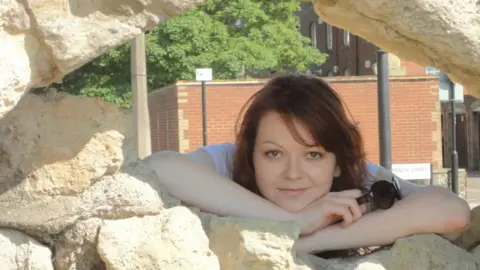 Yulia Skripal/Facebook
Yulia Skripal/FacebookHis daughter, Yulia, regularly travelled to the UK from her Moscow home to visit her father, relatives told the BBC.
"She told me she liked everything [in the UK]," childhood friend Irina Petrova said. "They had an amazing place, and amazing house."
She had an "excellent" relationship with her father, Ms Petrova said, and had been the "perfect kid", achieving excellent grades at school.
Ms Skripal, who friends say worked for multinationals including Nike and PepsiCo, was "always smiling, just like her mother", Ms Petrova added.
The 33-year-old was discharged from Salisbury District Hospital on 9 April and taken to a secure location.
It is not known what long-term effects she might suffer.
What more do we know about the family?
Mr Skripal's wife, Liudmila, died in 2012 after suffering from cancer. His elder brother and son have died in the past two years.
Some of the deaths, the family believe, happened in suspicious circumstances.
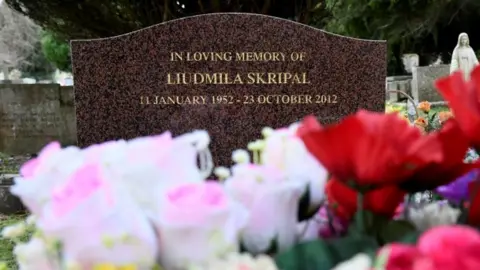 Reuters
ReutersHis son, Alexander Skripal, died aged 43 last July in St Petersburg from liver failure. He is buried in Salisbury, close to his mother.
Mr Skripal's family deny that he worked for MI6 and believe that the espionage case was fabricated by Russia.
On 5 April, an unverified recording purported to be between Yulia Skripal and her cousin, Viktoria Skripal, who lives in Russia, was broadcast on Russian TV.
In the recording, Viktoria said she hoped to travel to the UK to visit her relatives, if she can get a visa, but the voice said to be Yulia's tells her that no-one will give her one.
The Foreign Office said its Moscow embassy was expected to give Viktoria a visa and that she would be given full consular help in the UK.
Doubts have been cast on the authenticity of the recording.
What has the fallout been?
In the weeks after the poisoning, Theresa May pointed the finger at Russia and expelled 23 Russian diplomats and their families from the UK.
She also said:
- Ministers and the Royal Family would not attend the Fifa World Cup in Russia
- Russian state assets would be frozen if there was evidence they would be used as a weapon against UK nationals and residents
- Checks on private flights, customs and freight would be increased
- All planned high-level contacts between the UK and Russia would be suspended
- The state invitation to Russian's foreign minister Sergei Lavrov was retracted
In solidarity, 29 countries, including the US, Canada, Germany and France, expelled 145 Russian officials - and Nato ordered 10 Russians out of its mission in Belgium.
Moscow initially responded in kind, expelling 23 British diplomats, 60 US diplomats and several from other countries. It also closed the British Council in Russia and the British Consulate in St Petersburg.
Russia then increased that number to 50, as its ambassador in the UK said Moscow had no nerve agent stockpile.
Since the UK named the two suspects, US, France, Germany and Canada have agreed that the Russian government "almost certainly" approved the poisoning of the Skripals.
Together they have urged Russia to provide full disclosure of its Novichok programme.
Referring to the expulsion of Russian diplomats from their countries, the leaders said they had already "taken action together to disrupt the activities of the GRU". GRU officers are often stationed in embassies around the world.
What happened in Amesbury?
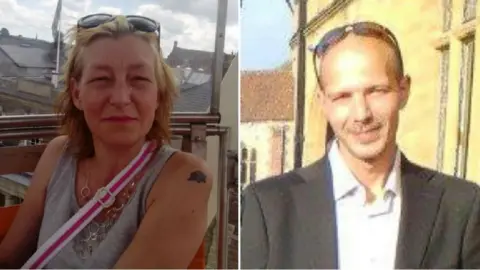 Facebook
FacebookPolice are linking the attack on the Skripals to a separate Novichok poisoning on 30 June in Amesbury, that led to the death of 44-year-old mother-of-three Dawn Sturgess.
She and her partner Charlie Rowley were exposed to the nerve agent after handling a contaminated perfume dispenser, labelled Nina Ricci Premier Jour.
Mr Rowley told police he found the box containing a small bottle and an applicator - all found to be counterfeit - in a charity bin.
He tried to put the two parts together and got some of the contents on himself. Ms Sturgess applied some of the contents to her wrists and became unwell.
Scotland Yard said the bottle, with a modified nozzle, had contained a "significant amount" of Novichok.
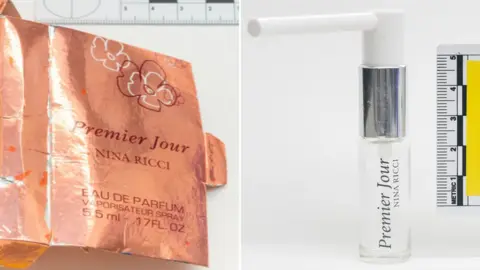 AFP/Met Police
AFP/Met Police What are Novichok agents?
The name Novichok means "newcomer" in Russian, and applies to a group of nerve agents developed by the Soviet Union in the 1970s and 1980s.
Novichok agents are liquids, although others are thought to exist in solid form and could be dispersed as an ultra-fine powder.
Some of the agents are also said to be "binary weapons", meaning the nerve agent is typically stored as two less toxic chemical ingredients that are easier to handle.
When these are mixed, they react to produce the active toxic agent which can cause convulsions, shortness of breath, profuse sweating and nausea.
Has this happened in the UK before?
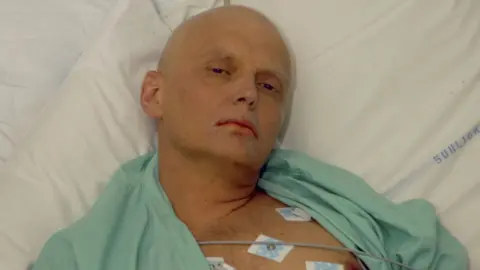 Getty Images
Getty ImagesThe possibility of an unknown substance being involved has drawn comparisons with the 2006 poisoning of Alexander Litvinenko.
The former Russian intelligence officer died in London after drinking tea laced with a radioactive substance.
A public inquiry concluded that his killing had probably been carried out with the approval of the Russian President, Vladimir Putin.
An investigation by Buzzfeed News claimed that there have been at least 14 deaths in the UK that US officials suspected were connected to Russia.

Do you have any information to share on this story? Do you have any questions you'd like us to investigate? Email [email protected].
Please include a contact number if you are willing to speak to a BBC journalist. You can also contact us in the following ways:
- WhatsApp: +447555 173285
- Tweet: @BBC_HaveYourSay
- Send pictures/video to [email protected]
- Upload your pictures/video here
- Send an SMS or MMS to 61124
